Photo: Evening Standard/Hulton Archive/Getty Images
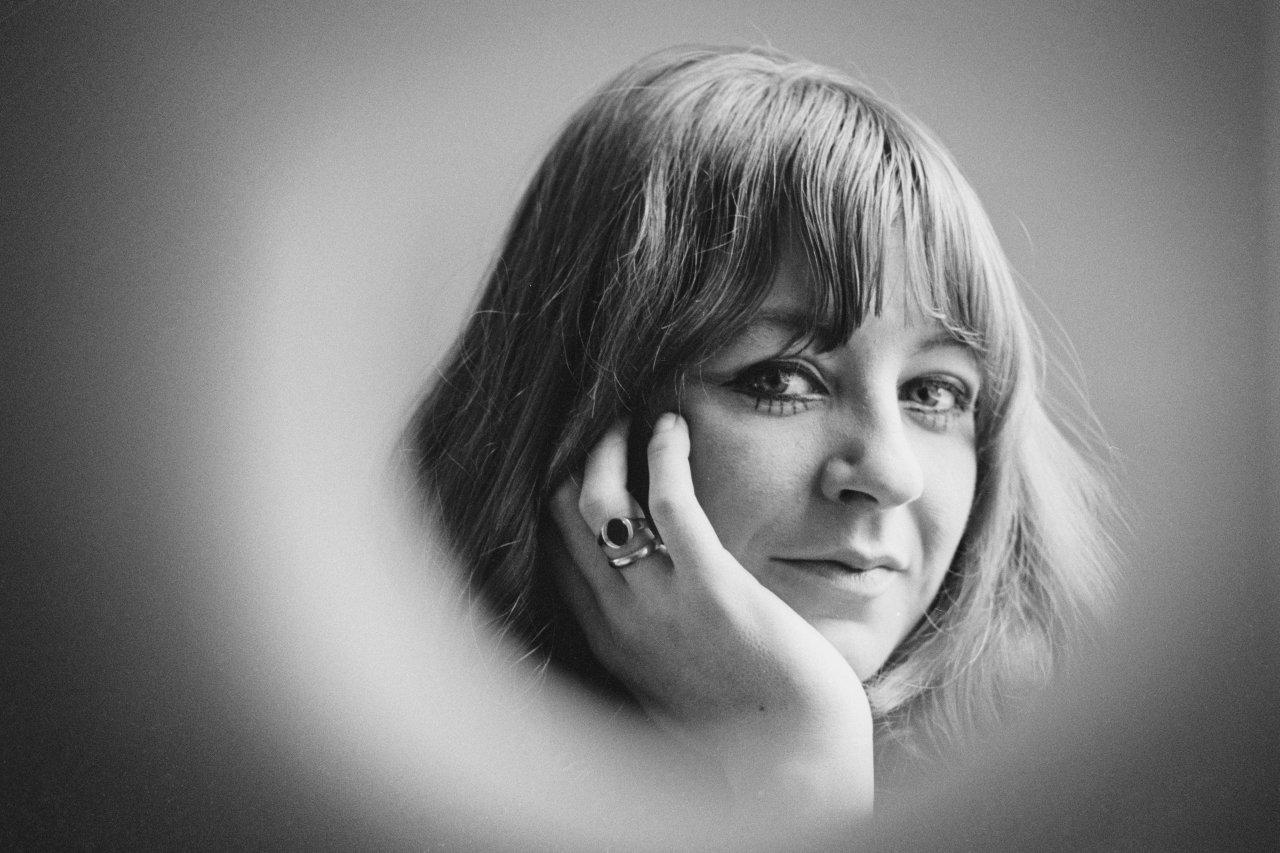
list
The Recording Academy Remembers The Music People We've Lost | GRAMMY In Memoriam (2022)
Take a moment to reflect on and salute the members of the music community we lost.
The following is a list of artists and industry professionals the music community lost from Jan. 1, 2022 to Dec. 6, 2022.
The 2022 GRAMMYs telecast on CBS featured an In Memoriam segment highlighting some of these individuals via a video tribute, and all of these individuals who died prior to its print date are included in the official 2023 GRAMMYs program book.
The Recording Academy salutes each individual for their respective talents and contributions to our culture and community.
Jody Abbot
Juan Alfonso Abreu (Xtassy)
Ernest Abuba
Bobbe "Beegie" Long Adair
Patrick Adams
Cynthia Albritton
Yuz Aleshkovsky
Clive "Zanda" Alexander
Drew Alexander
Silas "SiMan Baby" Alexander
Ian Alexander jr.
Mary Alice
Stu Allan
Jerry Ivan Allison
George al-Rassi
Ahmed Alshaiba
Lalith Anand
David Andersson
Ernie Andrews
Reggie Andrews
Nicholas Angelich
Stuart Anstis
Jon Appleton
Steve Arkin
Brooks Arthur
Maureen Arthur
Ibrahim Ashk
Bobby Atkins
Barry Bailey
Chris Bailey
Bamba Bakya
Silvia Baleani
Classie Ballou, Sr.
Gabe Baltazar
Alain Bancquart
Abhijit Bandyopadhyay
Sultan "Traxamillion" Banks
King Louie Bankston
Joseph Banowetz
Carlos Barbosa-Lima
Daniele Barioni
John Barnes
Scott Barnes
Walter Barylli
Edava Basheer
Eddie Basinski
Jules Bass
Shandler "Wavy Navy Pooh" Beaubien
Rose Beauchamp
Ana Bejerano
Daniel Belardinelli
Jerry Bentley
Teresa Berganza
Marilyn Bergman
John Beug
Guillame Bideau
Ryan Biggs
Yam Bing-yee
Bayron Binkley
Ali Birra
Harrison Birtwistle
Alan Blaikley
Lilian Blankson
Stéphane Blet
Philippe Boesmans
Peter Bogdanovich
Rolando Boldrin
Bill Bourne
Donald Brady
Jaimie Branch
Traci Braxton
Thom Bresh
Todd Brodginski
Peter Brook
Gary Brooker
Steve Broughton
Harpdog Brown
Johnny Brown
Julia Buciuceanu
Kai Bumann
Roman Bunka
Bruce Burch
Sonny Burke
Billie Burton
Joe Bussard
Nigel Butterley
Hal Bynum
Shorty Byrd
James Caan
Dennis Cahill
Eison Cai
Mickey Calin
Mira Calix
Sudie Callaway
Darius Campbell
Pat Campbell
Marciano Cantero
María José Cantilo
Allison Canzanella
Irene Cara
Giancarlo Cardini
Erasmo Carlos
Jo Carol Ann
Carleton Carpenter
Martín Carrizo
Pat Carroll
Jeff Carson
Aaron Carter
Darryl Caseine
Fred Catero
Guayo Cedeño
Jordi Cervello
Koady Chaisson
Heo Cham
Joe Chambers
Norm Chambers
Manny Charlton
Kerry Chater
Subhomoy Chatterjee
Levon Chaushian
Roland Anthony Chirico
Terry Choate
Abdul Gaffar Chowdhury
Miu Chu
Gene Cipriano
Roderick 'Pooh' Clark
Sammy Clark
Mike Clement
Dale Clevenger
Con Cluskey
Bob "Dr. Jazz" Cohen
Nick Colionne
"Chubby" Conine
Jeff Cook
Al Cooley
Tommy Cordell
Azio Corghi
Carmela Corren
José Luis Cortés
Gal Costa
Warren "Waz" Costello
Cathal Coughlan
Morty Craft
Zuri Craig
AB Crentsil
Lyell Cresswell
Bernard Cribbins
Charles Criss
Mike Cross
J.D. Crowe
Julee Cruise
George Crumb
Bettye Crutcher
Jerry Crutchfield
Ronnie Cuber
Scott Dachroeden
David Dalton
"Jessie D" Lee Daniels
Kal David
Betty Davis
Rosa de Castilla
Marc Lee Dé Hugar
Aurelio De La Vega
Paulino Deanda Bernal
Joey DeFrancesco
Mike Dekle
Emilio Delgado
Garth Dennis
Alex DePue
Bunny Diamond
Tabby Diamond
Don Dilling
Paulo Diniz
Jerry Doucette
Jane Dowden
Tyrone Downie
Lamont Dozier
Frank Drake
Martin C. Dreiwitz
Eddie Edwards Drennan
Paul Dufour
Noel Duggan
Shonka Dukureh
Howard Alexander Dumble
Brian Dunning
Jim Duty
Dennis East
John L. Eastman
Ray Edenton
Iwan Edwards
Jamal Edwards
Vince "CPO Boss Hogg" Edwards
Mickey Eichner
Dan Einstein
Mary Ellin Barrett
Kenward Elmslie
Ralph Emery
Greg Epler
Ernesto Cavour
Flavio Etcheto
Archie Eversole
Maria Ewing
Ulises Eyherabide
Doug Eyink
Muvaffak "Maffy" Falay
Xue Fan
Dewey Farmer
Christine Farnon
Ben Farrell
Mitch Faulkner
Nolan Faulkner
Daniel Fawcett
Tim Feerick
Núria Feliu
Ludmila Ferber
Fallece Bernardo Adam Ferrero
Steve Fickinger
Bert Fields
Eberhard Finke
Annie Flanders
Neil Flanz
Jorja Fleezanis
Mark Fleischman
Andy Fletcher
Jake Flint
Gianluca Floris
Adam Foster
Juan Francisco González
Deborah Fraser
George Frayne
Dallas Frazier
Wes Freed
David Freel
Joe Friedman
Bill Fries
Leo Anthony Gallagher Jr.
Ron Gallela
Luiz Galvao
Armando Gama
Ricky Gardiner
Rita Gardner
Ray Garduño
Charles "is-City" Gatt
Franco Gatti
Jan Gaye
Fred Geiger
Geoff Nuttall
Donny Gerrard
Joe Gilchrist
Mickey Gilley
Ellen Zoe Golden
Burt Goldstein
Darío Gómez
Doc Gonzales
Francisco González
Dallas Good
Tristan Goodall
Sam Gooden
Mick Goodrick
Robert Gordon
Robert Louis Gordy
Gilbert Gottfried
Don Grahm
Randy Gray
Helen Grayco
John Green
Bruce Greig
John Grenell
Arthur Grigoryan
Howard Grimes
Steve Grimmett
Zhou Guangren
Agustin Gurza
Barbara Maier Gustern
Song Hae
Patrick Haggerty
Dick Halligan
Alexander Hamilton
Duncan Hannah
Ed Hardy
Alice Harnoncourt
William Hart
"Big John" Harte
John Hartman
Orrin Hatch
Ronnie Hawkins
Rosa Lee Hawkins
Ivonne Haza
Bob Heathcote
Michael Henderson
Judy Henske
Marva Hicks
Jimbeau Hinson
Arnold "Arno" Hintjens
Tohru "Monamour" Hiroshima
Gary "Chicken" Hirsh
Jim Horn
Joseph Horovitz
Damodar Hota
Franz Hummel
Darryl Hunt
Ivy Jo Hunter
Hovain Hylton
Pau Riba i Romeva
Toshi Ichiyanagi
Simon Illa
İlhan İrem
Colleen Ironside
Susan Jacks
Francis Jackson
Michael James Jackson
Big Rude Jake
Khan Jamal
Joni James
Conrad Janis
Danny Javier
Philip Jeck
Lee Jihan
Griselda Jiménez
Fredrik Johansson
Mable John
Jimmy Johnson
Keith Wonderboy Johnson
Syl Johnson
Wilko Johnson
Jerry Ray Johnston
Leslie Jordan
Justin Alexander "J $tash" Joseph
Kenwrick "Kenny J" Joseph
Marvin Josephson
Naomi Judd
Orlando Julius
Bang Jun-seok
Michail Jurowski
Danny Kalb
Joseph Kalichstein
Ramdas Kamat
Prafulla Kar
Ryan Karazija
Lil Keed
Ken Kelly
Sean Kelly
Jimmy Kennedy
Anita Kerr
Alam Khan
Ronnie Kidd
Hamish Kilgour
Douglas Kirkland
Margo Knesz
Dale Knippers
Stamatis Kokotas
Irini Konitopoulou-Legaki
Charles Koppelman
John C. Koss
William Kraft
Blanka Kulinska
Jaakko Kuusisto
Dr. Paul Kwami
Carmelo La Bionda
Art Laboe
Bappi Lahiri
Jayananda Lama
Mark Lanegan
Michael Lang
Mike Lang
Angela Lansbury
Sam Lay
Q Lazzarus
Willie Leacox
Marcus Leatherdale
Pastelle LeBlanc
Everett Lee
Quentin Oliver Lee
Mon Legaspi
Keith Levene
Mark Levine
Mariusz Lewandowski
Ramsey Lewis
Don Lewis
Gord Lewis
Jerry Lee Lewis
Jon Lind
Ray Liotta
Lenny Lipton
Meat Loaf
Kevin Locke
Bob Lokman
Jim Long
Jun Lopito
Bob LuPone
Radu Lupu
Loretta Lynn
Warner Mack
Shirles "Re Styles" Macleod
Shel Macrae
Al Mair
Kyle Maite
Clyde Maness
Lata Mangeshkar
Lucy Rowan Mann
Ken Mansfield
Álvaro Manzano
James Maraniss
Jane "Nightbirde" Marczewski
Sid Mark
Emmaretta Marks
Kurt Markus
Ingram Marshall
Bernabé Martí
Brad Martin
Diane Martin
Gavin Martin
Keith Martin
Mac Martin
Mor Mario Martínez
Randall Massengill
Janez Maticic
Tito Matos
Tina May
Lowry Mays
Gazi Mazharul Anwar
Dan McCafferty
Mary McCaslin
Deborah McCrary
David McDonald
Ian McDonald
John McGale
Bob McGrath
Douglas McGrath
Doug McKean
Noel McKoy
John McLeod
Christine McVie
Sister Janet Mead
Glenn Meadows
Eric Mercury
María Mérida
Joe Messina
Blake Mevis
Pablo Milanes
Ron Miles
Jody Miller
Sidney Miller
Sue Mingus
Zelito Miranda
Nirmala Mishra
Charnett Moffett
Franz Mohr
Boris Moiseev
Bill Mollman
Mick Moloney
Grachan Moncur III
Gracia Montes
Benjamin Moore, Jr.
Mike Mora
Owen Moran
Massimo Morante
Henrique Morelenbaum
Denroy Morgan
Tommy Morgan
Joel Morowitz
Barbara Morrison
Robert Morse
Juan José Mosalini
Rodger E. Mosley
Mighty Mouse
James Mtume
Sandhya Mukherjee
Dudley Murphy
David Muse
Rachel Nagy
Pierre Narcisse
María Inés Naveillán
Nolan Neal
Tommy Neal
Dawit Nega
Bobbie Nelson
Sandy Nelson
Hans Neuenfels
Bobby Neuwirth
Don Newkirk
Olivia Newton-John
Nichelle Nichols
Mariana Nicolesco
Rab Noakes
Paolo Noel
Minoru Nojima
Neil Nongkynrih
Adibah Noor
Nayyara Noor
Monty Norman
Ica Novo
Carlo Nuccio
Bobby O'Jay
Sammie Okposo
David Ornette Cherry
Mariel Orr
Anthony Ortega
Dave Osborne
Mo Ostin
Karim Ouellet
Jim Owens
Pedro Pablo García Caffi
LaShun Pace
Irene Papas
Gloria Parker
Mimi Parker
Tom Parker
Dez Parkes
Leslie Parnas
Ric Parnell
Fred Parris
Anne Parsons
Philip Paul
D.H. Peligro
Osvaldo Peredo
Jacques Perrin
Mark L. Perthel
Libor Pesek
Marybeth Peters
Maggie Peterson
Greg Philbin
Idris Phillips
Svika Pick
Keaton Pierce
Renée Pietrafesa
Don Pippin
Galina Pisarenko
Bill Pitman
Paul Plimley
Sidney Poitier
Prins Polo
Jerzy Polomski
Bruce Pomahac
Jim Post
Gerald Potterton
Jesse Powell
Richard Pratt
Seymour "Red" Press
Simon Preston
James Price
Howie Pyro
Charles Quillen
Rubina Qureshi
James Rado
Bob Rafelson
Aki Rahimovski
S.V. Ramanan
Agustin Ramirez
Randy Rand
Alleppey Ranganath
Raymond Raposa
James Reams
Pete Reiniger
Patricio Renán
Hollis Resnik
John Rice Irwin
Robert Richards
Riky Rick
Walter Riley King
Ismael Rivera Jr.
Archie Roach
Richard Roat
Hargus "Pig" Robbins
Sandy Roberton
Garry Roberts
Martin "Marty" Roberts
PnB Rock
Pamela "Jordan" Rooke
Ned Rorem
Art Rosenbaum
Andy Ross
Beverly Ross
Cormac Roth
Badal Roy
Jamie Roy
Ed Rudy
Art Rupe
Bobby Rydell
Paul Ryder
Jordi Sabatés
Samir Sabri
Wally Safford
Balwinder Safri
Bob Saget
Daniel Sahad
Teruhiko Saigo
Steve Salas
Marty Sammon
Pharoah Sanders
T.V. Sankaranarayanan
Manolo Sanlucar
José Enrique "Chelique" Sarabia
Peter Scaping
Leon Schidlowsky
Klaus Schulze
Chris Scicluna
JayDaYongan
Richard Seal
Jim Seals
Gabe Serbian
Richard Setlowe
Shiv Kumar Sharma
Yuri Shatunov
William B. Shelby
Burke Shelley
Liz Sheridan
Dave Sherman
Kirti Shiledar
Guitar Shorty
Terry Shue
Riho Sibul
Paul Siebel
David "Ziggy" Sigmund
Haralds Simanis
Calvin Simon
Joanna Simon
Lucy Simon
Joyce Sims
Bhupinder Singh
Roslyn Singleton
Herschel Sizmore
Arnold Skolnick
Alexander Skulsky
DJ Kay Slay
Young Slo-Be
Elliott "Grandpa" Small
Dave Smith
Dick Smith
Steve Smith
B. Smyth
Elza Soares
Jim Sohns
Josep Soler
Stefan Soltesz
R Somasekharan
Bhajan Sopori
Paul Sorvino
Pervis Spann
Ronnie Spector
Willie Spence
Buddy Spurlock
Pete St John
Meghan Stabile
Atilio Stampone
Pat Stay
Saundra Steele
Antonietta Stella
Elizabeth Stewart
Jim Stewart
Paul Stoddard
Laila Storch
Larry Storch
Trevor Strnad
Mark Stroman
Shivamogga Subbanna
Alec John Such
Monnette Sudler
Frederick Swann
Earl Swavey
John Swenson
Robin Sylvester
Yoram Taharlev
Marc Tanner
Joe Tarsia
Richard Taruskin
Carolyn Tate
Greg Tate
Creed Taylor
Dean Taylor
Morgan Taylor
Terry Teachout
Judy Tenuta
Arnold Terry
Nicky Tesco
Dev Tharikewala
Timmy Thomas
Barbara Thompson
Bjorn Thorsrud
Janet Thurlow
Jin Tielin
Clifford S. Tinder
Louise Tobin
Terry Tolkin
Louise Tomberlain
Alexander Toradze
Colin Touchin
Bramwell Tovey
Rosmarie Trapp
Héctor Tricoche
Dick Trump
Tokollo Tshabalala
Tuck Tucker
Brett Tuggle
Nik Turner
Rick Turner
Sonny Turner
Bob Tutupoly
Margaret Urlich
Frank Ursoleo
Bin Valencia
Paul Vance
John P Varkey
Josephine Veasey
Diego Verdaguer
Lars Vogt
William "Bil" VornDick
Adam Wade
Abdul Wadud
Natty Wailer
Sidhu Moose Wala
Bill Walker
Kenneth Wannberg
Dennis Waterman
Norma Waterson
Jody Wayne
Jay Weaver
Greg Webster
Lil Bo Weep
Bobby Weinstein
Mike Wells
Jan Welmers
Janice Wendell
Ken West
Sonny West
Glenn Wheatley
Joel Whitburn
Alan White
Carrie White
Roland White
Krista Whitworth Beitter
Neela Wickramasinghe
Jan Wijn
Snootie Wild
David O. Will
Ken Williams
Robert Williams
Don Wilson
George Winn
Geoff Wonfor
TDott Woo
Terry Woodson
Max Woodward
Andrew Woolfolk
Scotty Wray
Bernard Wright
Qiao Yu
Phyo Zayar Thaw
Jon Zazula
Drummie Zeb
Bezbaruah
Club Q Victims
Coolio
Dakis
DJ Sumbody
El Noba
FBG
Goonew
Hadrawi
Hurricane G
Kandikonda
KK
Mikaben
Skibadee
Takeoff
Tame One
Trouble
Vangelis
Walkie
Walsh
YOSHI
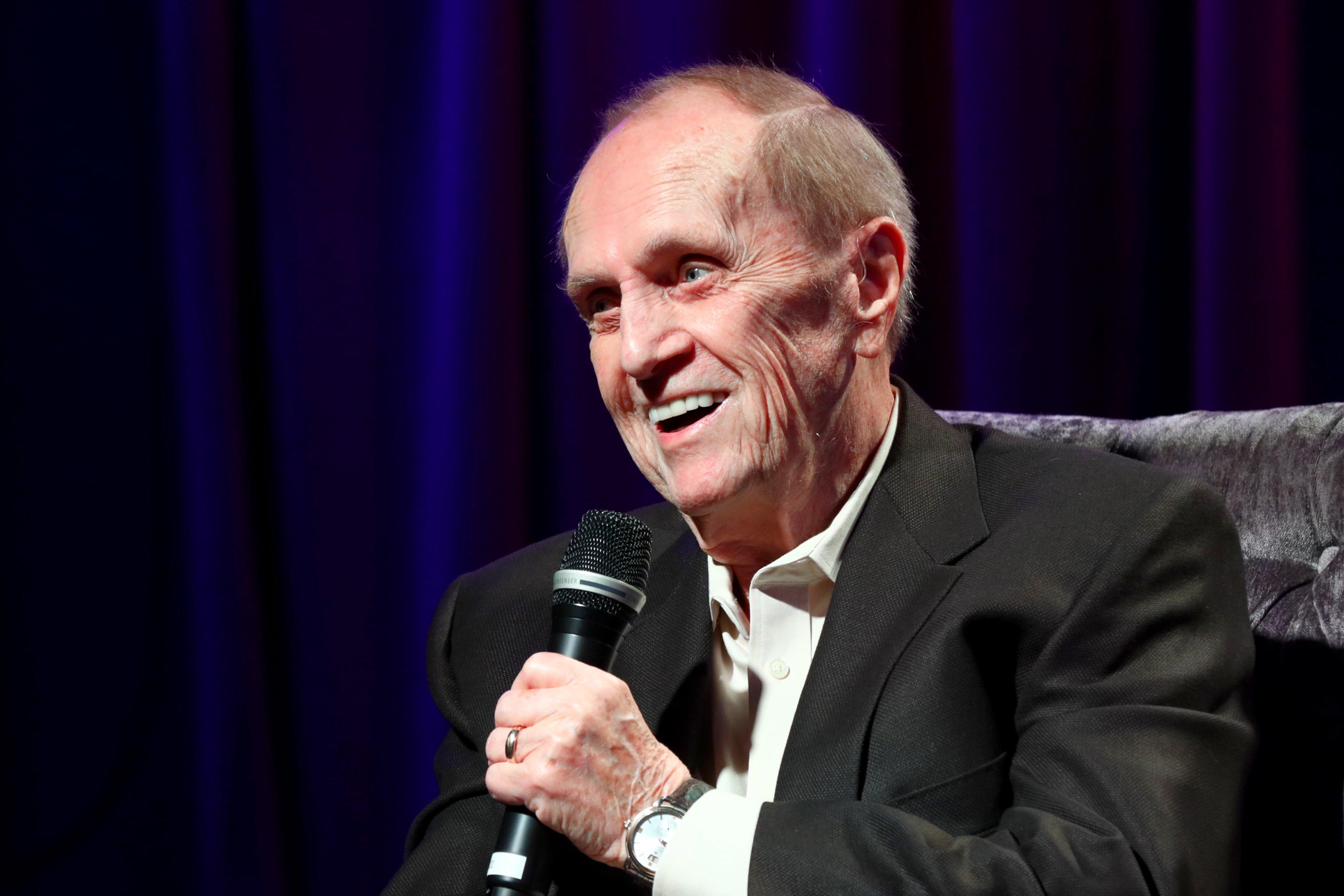
Photo: Rebecca Sapp/WireImage
news
Remembering Bob Newhart, The Comic Who Made GRAMMY History With His Debut Album
The legendary comic, whose work onstage and on screen spanned multiple generations, passed away at age 94 on July 18.
Bob Newhart, one of the most celebrated comedians of his generation and renowned for his deadpan delivery died at his home in Los Angeles on July 18. He was 94.
Awarded the John F. Kennedy Center for the Performing Arts’ Mark Twain Prize for American Humor in 2002, Newhart launched his career with a record-setting record. By the time he transitioned to television with two successful sitcoms, he had become a household name.
Newhart made his vinyl debut on April Fool’s Day in 1960, when Warner Brothers Records released his first comedy album, The Button-Down Mind of Bob Newhart. A year later, at the 3rd GRAMMY Awards, the former accountant-turned-comic took home three golden gramophones.
At the 1961 GRAMMYs, Newhart won Album Of The Year — beating out two classical albums as well as works by Nat King Cole, Frank Sinatra and Harry Belafonte. Newhart also won Best New Artist at that year's ceremony and, to this day, is the only comedian to win in both categories.
Recorded live on Feb. 10, 1960 at the Tidelands Motor Inn in Houston, Button Down Mind also became the first comedy audio album to reach No. 1 on the Billboard 200 chart. The album is widely considered to be one of the most consequential comedy albums of the 20th century and, fittingly, features the subtitle The Most Celebrated New Comedian Since Attila (the Hun).
The album was added to the Library of Congress’s National Recording Registry in 1960. That year, The New York Times noted that Newhart was “the first comedian in history to come to prominence through a recording.” In 2007, the Recording Academy inducted The Button-Down Mind of Bob Newhart into the GRAMMY Hall of Fame.
His second album, The Button-Down Mind Strikes Back!, similarly topped the Billboard charts and earned Newhart his third GRAMMY Award, this time for Best Comedy Performance — Spoken Word.
Newhart received two additional GRAMMY nods during this illustrious career: His Button Down Concert album was nominated for Best Spoken Comedy Album at the 40th GRAMMY Awards, and nine years later his I Shouldn't Even Be Doing This! was nominated for Best Spoken Word Album.a
The success of Button-Down Mind led to the launch of Newhart's long TV career. His NBC variety show, "The Bob Newhart Shot" only lasted one season, but earned an Emmy for Outstanding Comedy Series in 1962. Newhart found greater success through CBS, which broadcast a series of the same name. On the second "The Bob Newhart Show," which ran from 1972 to 1978, the comic actor played a psychologist,
Four years later, he followed up with another sitcom, "Newhart," which aired until 1990 and in which Newhart played a Vermont innkeeper.
Bob Newhart has continued to have a presence on the small screen. His recording debut has been referenced in a variety of contemporary period shows, including "Mad Men" and "The Marvelous Mrs. Maisel."
During his decades-long television career, Newhart received nine EMMY nominations, including as Outstanding Lead Actor in a Comedy Series over three consecutive years for "Newhart" and three for Outstanding Guest Actor in a Comedy Series for his appearances on CBS’ "The Big Bang Theory."
Born George Robert Newhart on Sept. 5, 1929, in Oak Park, Illinois, Newhart graduated from Loyola University of Chicago in 1952 with a degree in accounting. After serving in the Army during the Korean War, he returned to Loyola for law school, but dropped out and pursued office work.
Newhart worked as an accountant for United States Gypsum Corp., which manufactures construction materials, and later as a copywrighter for Fred Niles Films Company in Chicago. During that time, Newhart began recording "long, antic" phone calls with a friend as audition tapes for comedy jobs. They caught the attention of a Chicago disc jockey, who introduced Newhart to the head of talent at Warner Bros. Records and which led to a life-changing contract in 1959.
It was in the latter category that Newhart won his first and only Emmy in 2013, 20 years after the Academy of Television Arts and Sciences inducted him into its Hall of Fame.
Remembering Legends & History-Makers
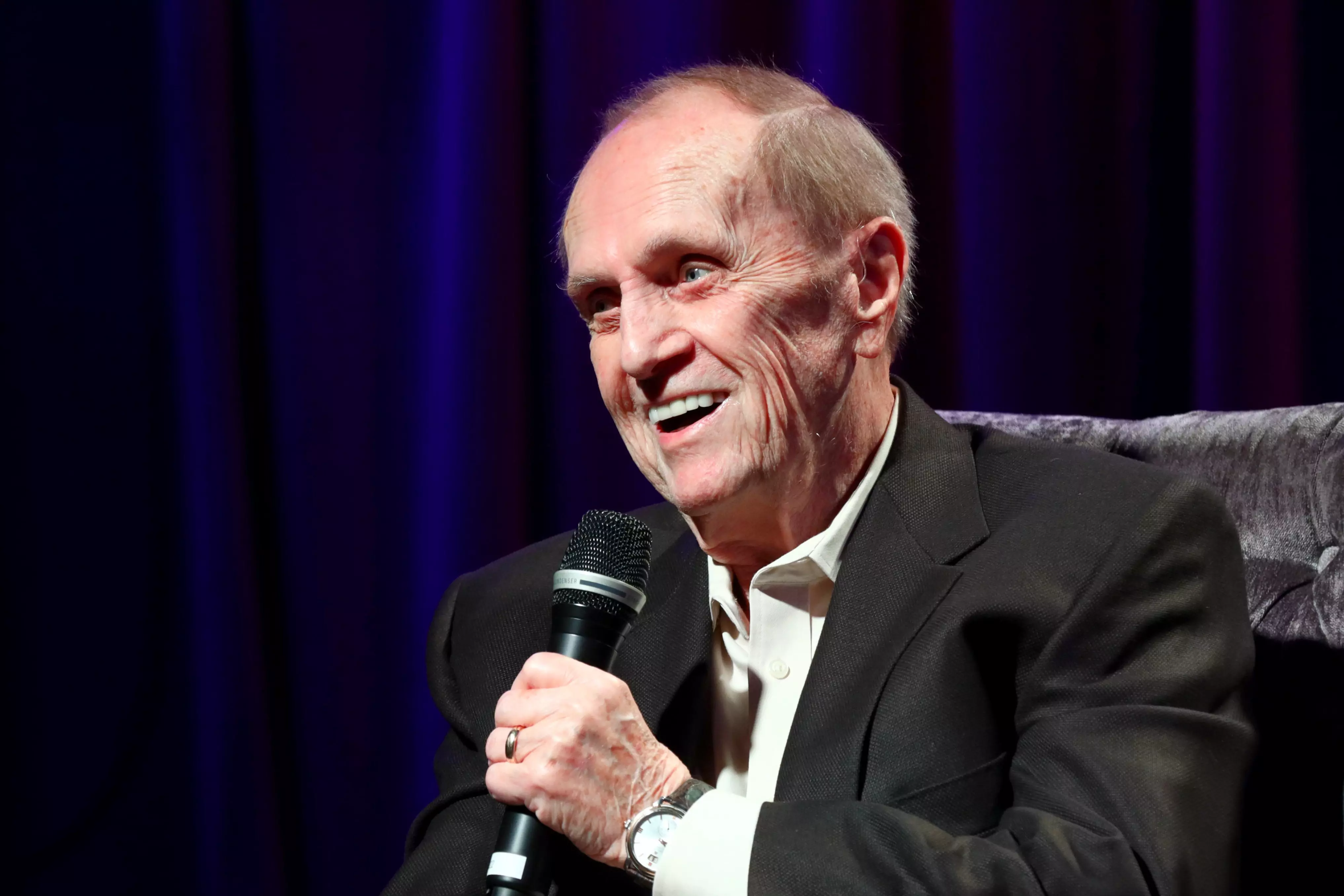
Remembering Bob Newhart, The Comic Who Made GRAMMY History With His Debut Album
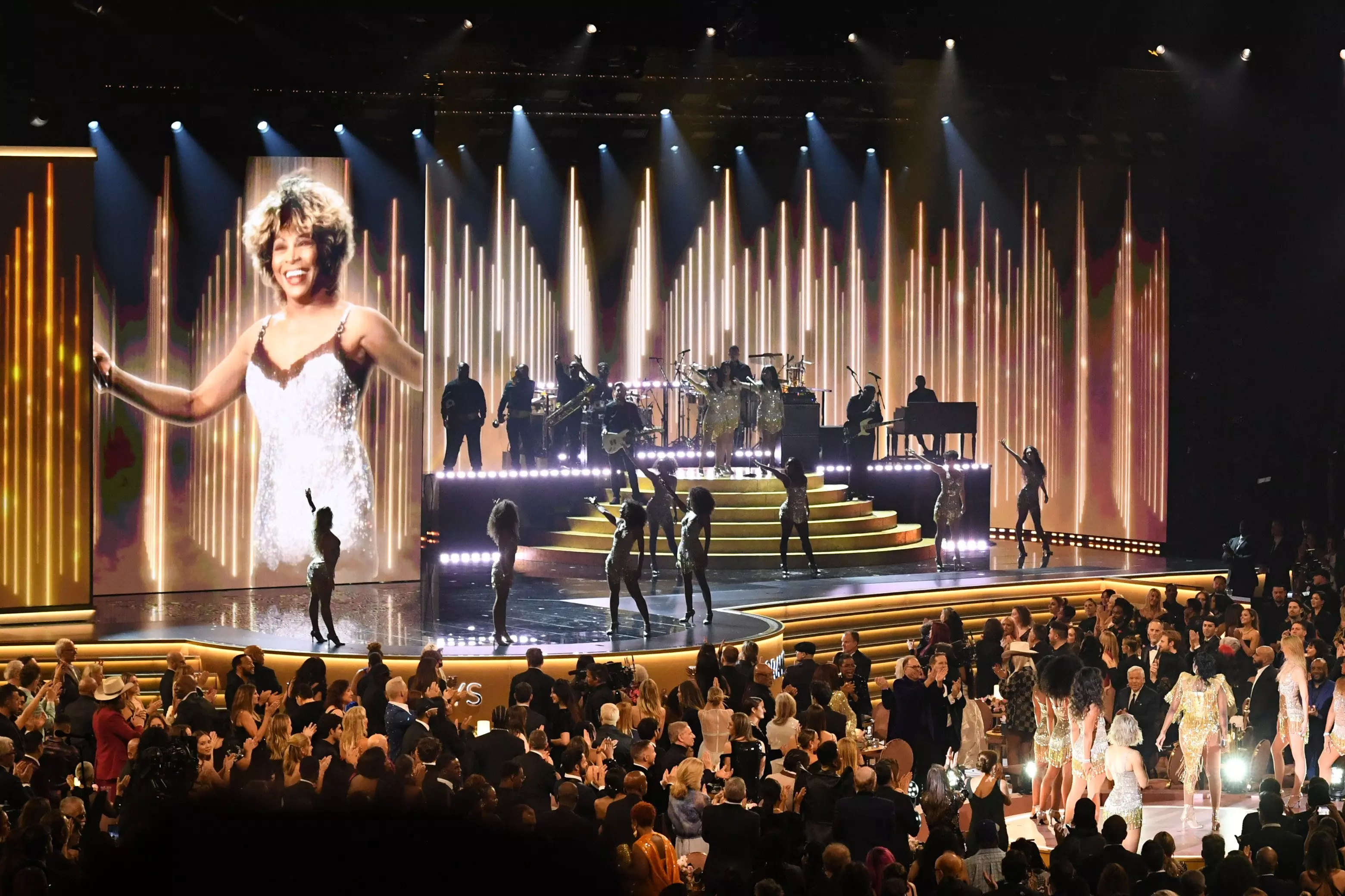
2024 GRAMMYs In Memoriam: Stevie Wonder, Lenny Kravitz & More Pay Tribute To Late Icons
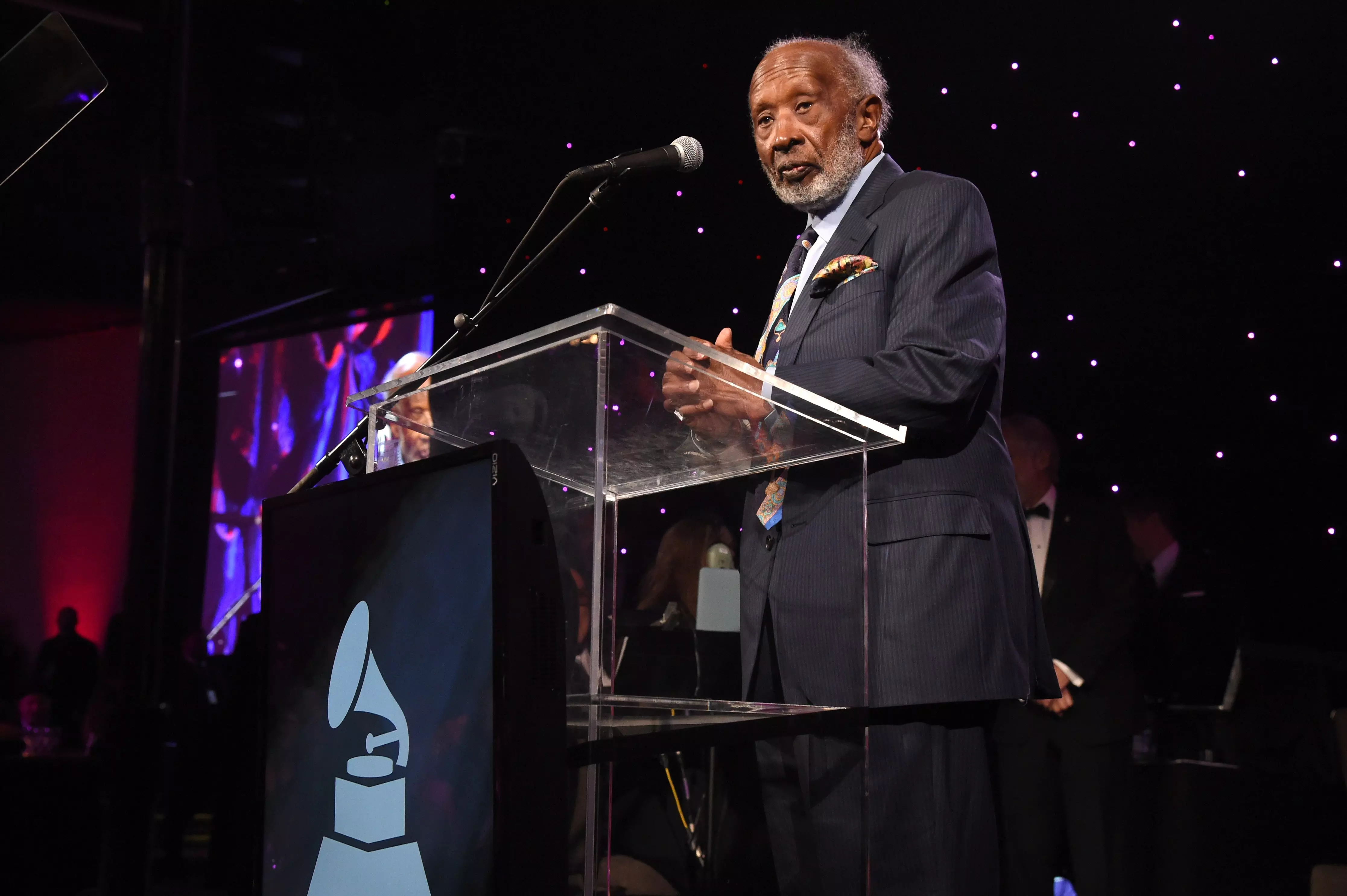
Remembering Clarence Avant: The Black Godfather, Renowned Entertainment Mentor & Recording Academy Honoree
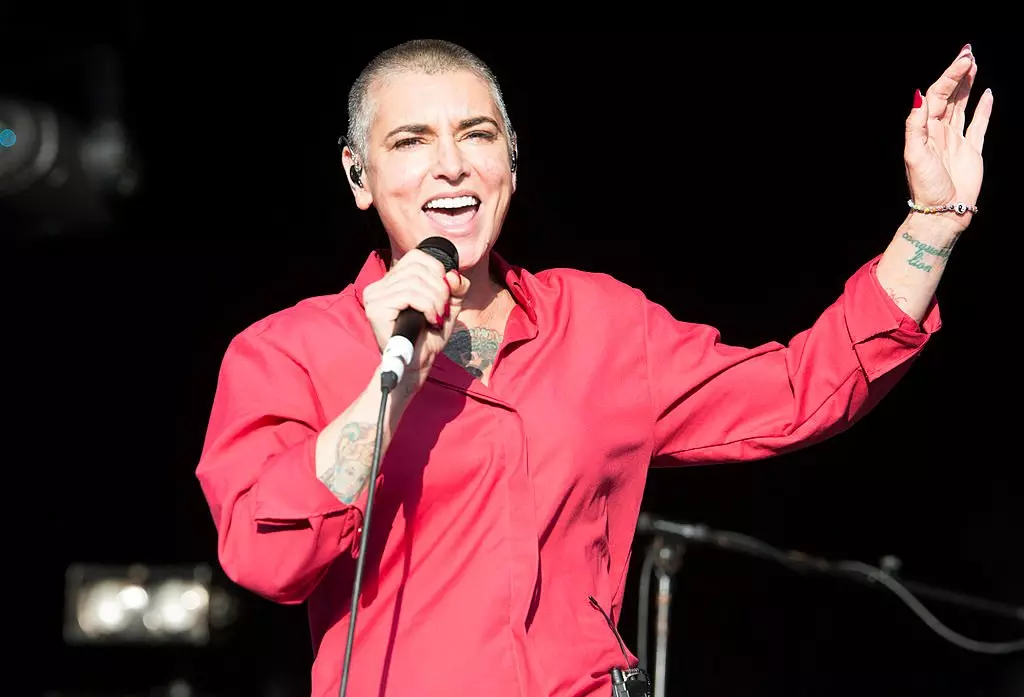
Remembering Sinéad O’Connor: 5 Essential Tracks By The Iconoclastic Singer/Songwriter
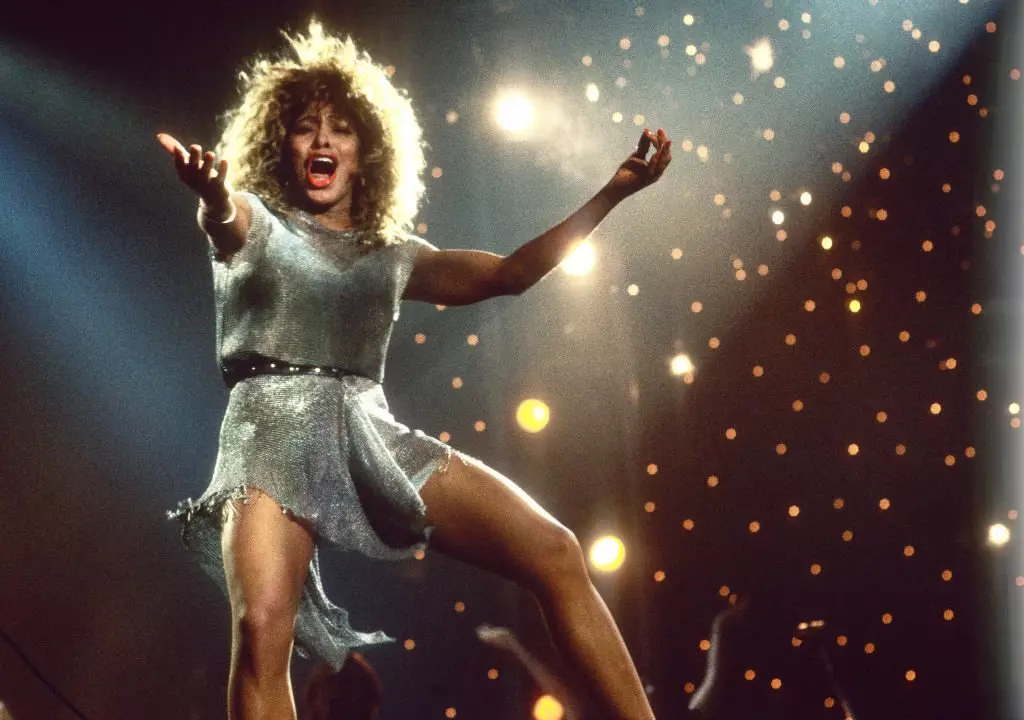
Remembering The Artistry Of Tina Turner, "The Epitome Of Power And Passion"

Photo: Aitor Laspiur
interview
Omar Apollo Embraces Heartbreak And Enters His "Zaddy" Era On 'God Said No'
Alongside producer Teo Halm, Omar Apollo discusses creating 'God Said No' in London, the role of poetry in the writing process, and eventually finding comfort in the record's "proof of pain."
"Honestly, I feel like a zaddy," Omar Apollo says with a roguish grin, "because I'm 6'5" so, like, you can run up in my arms and stay there, you know what I mean?"
As a bonafide R&B sensation and one of the internet’s favorite boyfriends, Apollo is likely used to the labels, attention and online swooning that come with modern fame. But in this instance, there’s a valid reason for asking about his particular brand of "zaddyhood": he’s been turned into a Bratz doll.
In the middle of June, the popular toy company blasted a video to its nearly 5 million social media followers showing off the singer as a real-life Bratz Boy — the plastic version draped in a long fur coat (shirtless, naturally), with a blinged-out cross necklace and matching silver earrings as he belts out his 2023 single "3 Boys" from a smoke-covered stage.
The video, which was captioned "Zaddy coded," promptly went viral, helped along by an amused Apollo reposting the clip to his own Instagram Story. "It was so funny," he adds. "And it's so accurate; that's literally how my shows go. It made me look so glamorous, I loved it."
The unexpected viral moment came with rather auspicious timing, considering Apollo is prepping for the release of his hotly anticipated sophomore album. God Said No arrives June 28 via Warner Records.
In fact, the star is so busy with the roll-out that, on the afternoon of our interview, he’s FaceTiming from the back of a car. The day prior, he’d filmed the music video for "Done With You," the album’s next single. Now he’s headed to the airport to jet off to Paris, where he’ll be photographed front row at the LOEWE SS25 men’s runway show in between Sabrina Carpenter and Mustafa — the latter of whom is one of the few collaborators featured on God Said No.
Apollo’s trusted co-writer and producer, Teo Halm, is also joining the conversation from his home studio in L.A. In between amassing credits for Beyoncé (The Lion King: The Gift), Rosalía and J Balvin (the Latin GRAMMY-winning "Con Altura"), SZA ("Notice Me" and "Open Arms" featuring Travis Scott) and others, the 25-year-old virtuoso behind the boards had teamed up with Apollo on multiple occasions. Notably, the two collabed on "Evergreen (You Didn’t Deserve Me At All)," which helped Apollo score his nomination for Best New Artist at the 2023 GRAMMYs.
In the wake of that triumph, Apollo doubled down on their creative chemistry by asking Halm to executive produce God Said No. (The producer is also quick to second his pal’s magnetic mystique: "Don't get it twisted, he's zaddy, for sure.")
Apollo bares his soul like never before across the album’s 14 tracks, as he processes the bitter end of a two-year relationship with an unnamed paramour. The resulting portrait of heartbreak is a new level of emotional exposure for a singer already known for his unguarded vulnerability and naked candor. (He commissioned artist Doron Langberg to paint a revealing portrait of him for the cover of his 2023 EP Live For Me, and unapologetically included a painting of his erect penis as the back cover of the vinyl release.)
On lead single "Spite," he’s pulled between longing and resentment in the wake of the break-up over a bouncing guitar riff. Second single "Dispose of Me" finds Apollo heartsick and feeling abandoned as he laments, "It don’t matter if it’s 25 years, 25 months/ It don’t matter if it’s 25 days, it was real love/ We got too much history/ So don’t just dispose of me."
Elsewhere, the singer offers the stunning admission that "I would’ve married you" on album cut "Life’s Unfair." Then, on the very next song — the bumping, braggadocious "Against Me" — Apollo grapples with the reality that he’s been permanently altered by the love affair while on the prowl for a rebound. "I cannot act like I’m average/ You know that I am the baddest bitch," he proclaims on the opening verse, only to later admit, "I’ve changed so much, but have you heard?/ I can’t move how I used to."
More Omar Apollo News & Videos

Omar Apollo Embraces Heartbreak And Enters His "Zaddy" Era On 'God Said No'

How Danna Paola Created 'CHILDSTAR' By Deconstructing Herself

On Omar Apollo's New EP 'Live for Me,’ Limitless Experimentation Created Catharsis

Listen To GRAMMY.com's LGBTQIA+ Pride Month 2023 Playlist Featuring Demi Lovato, Sam Smith, Kim Petras, Frank Ocean, Omar Apollo & More

Omar Apollo On “Evergreen,” Growth & Longing
Given the personal subject matter filling God Said No — not to mention the amount of acclaim he earned with Ivory — it would be understandable if Apollo felt a degree of pressure or anxiety when it came to crafting his sophomore studio set. But according to the singer, that was entirely not the case.
"I feel like I wouldn’t be able to make art if I felt pressure," he says. "Why would I be nervous about going back and making more music? If anything, I'm more excited and my mind is opened up in a whole other way and I've learned so much."
In order to throw his entire focus into the album’s creation, Apollo invited Halm to join him in London. The duo set up shop in the famous Abbey Road Studios, where the singer often spent 12- to 13-hour days attempting to exorcize his heartbreak fueled by a steady stream of Aperol spritzes and cigarettes.
The change of scenery infused the music with new sonic possibilities, like the kinetic synths and pulsating bass line that set flight to "Less of You." Apollo and Halm agree that the single was directly inspired by London’s unique energy.
"It's so funny because we were out there in London, but we weren't poppin' out at all," the Halm says. "Our London scene was really just, like, studio, food. Omar was a frickin' beast. He was hitting the gym every day…. But it was more like feeding off the culture on a day-to-day basis. Like, literally just on the walk to the studio or something as simple as getting a little coffee. I don't think that song would've happened in L.A."
Poetry played a surprisingly vital role in the album’s creation as well, with Apollo littering the studio with collections by "all of the greats," including the likes of Ocean Vuong, Victoria Chang, Philip Larkin, Alan Ginsberg, Mary Oliver and more.
"Could you imagine making films, but never watching a film?" the singer posits, turning his appreciation for the written art form into a metaphor about cinema. "Imagine if I never saw [films by] the greats, the beauty of words and language, and how it's manipulated and how it flows. So I was so inspired."
Perhaps a natural result of consuming so much poetic prose, Apollo was also led to experiment with his own writing style. While on a day trip with his parents to the Palace of Versailles, he wrote a poem that ultimately became the soaring album highlight "Plane Trees," which sends the singer’s voice to new, shiver-inducing heights.
"I'd been telling Teo that I wanted to challenge myself vocally and do a power ballad," he says. "But it wasn't coming and we had attempted those songs before. And I was exhausted with writing about love; I was so sick of it. I was like, Argh, I don't want to write anymore songs with this person in my mind."
Instead, the GRAMMY nominee sat on the palace grounds with his parents, listening to his mom tell stories about her childhood spent in Mexico. He challenged himself to write about the majestic plane tree they were sitting under in order to capture the special moment.
Back at the studio, Apollo’s dad asked Halm to simply "make a beat" and, soon enough, the singer was setting his poem to music. (Later, Mustafa’s hushed coda perfected the song’s denouement as the final piece of the puzzle.) And if Apollo’s dad is at least partially responsible for how "Plane Trees" turned out, his mom can take some credit for a different song on the album — that’s her voice, recorded beneath the same plane tree, on the outro of delicate closer "Glow."
Both the artist and the producer ward off any lingering expectations that a happy ending will arrive by the time "Glow" fades to black, however. "The music that we make walks a tightrope of balancing beauty and tragedy," Halm says. "It's always got this optimism in it, but it's never just, like, one-stop shop happy. It's always got this inevitable pain that just life has.
"You know, even if maybe there wasn't peace in the end for Omar, or if that wasn't his full journey with getting through that pain, I think a lot of people are dealing with broken hearts who it really is going to help," the producer continues. "I can only just hope that the music imparts leaving people with hope."
Apollo agrees that God Said No contains a "hopeful thread," even if his perspective on the project remains achingly visceral. Did making the album help heal his broken heart? "No," he says with a sad smile on his face. "But it is proof of pain. And it’s a beautiful thing that is immortalized now, forever.
"One day, I can look back at it and be like, Wow, what a beautiful thing I experienced. But yeah, no, it didn't help me," he says with a laugh.
Latest News & Exclusive Videos

2024 Paris Olympics Opening Ceremony: Watch Celine Dion, Lady Gaga, Gojira & More Perform

Ice Spice Is The Drill Queen On 'Y2K!': 5 Takeaways From Her Debut Album

New Music Friday: Listen To New Songs From Halsey, MGK And Jelly Roll, XG & More

Watch Young MC Win Best Rap Performance In 1990

The Red Clay Strays Offer A New Kind Of Religion With 'Made By These Moments'
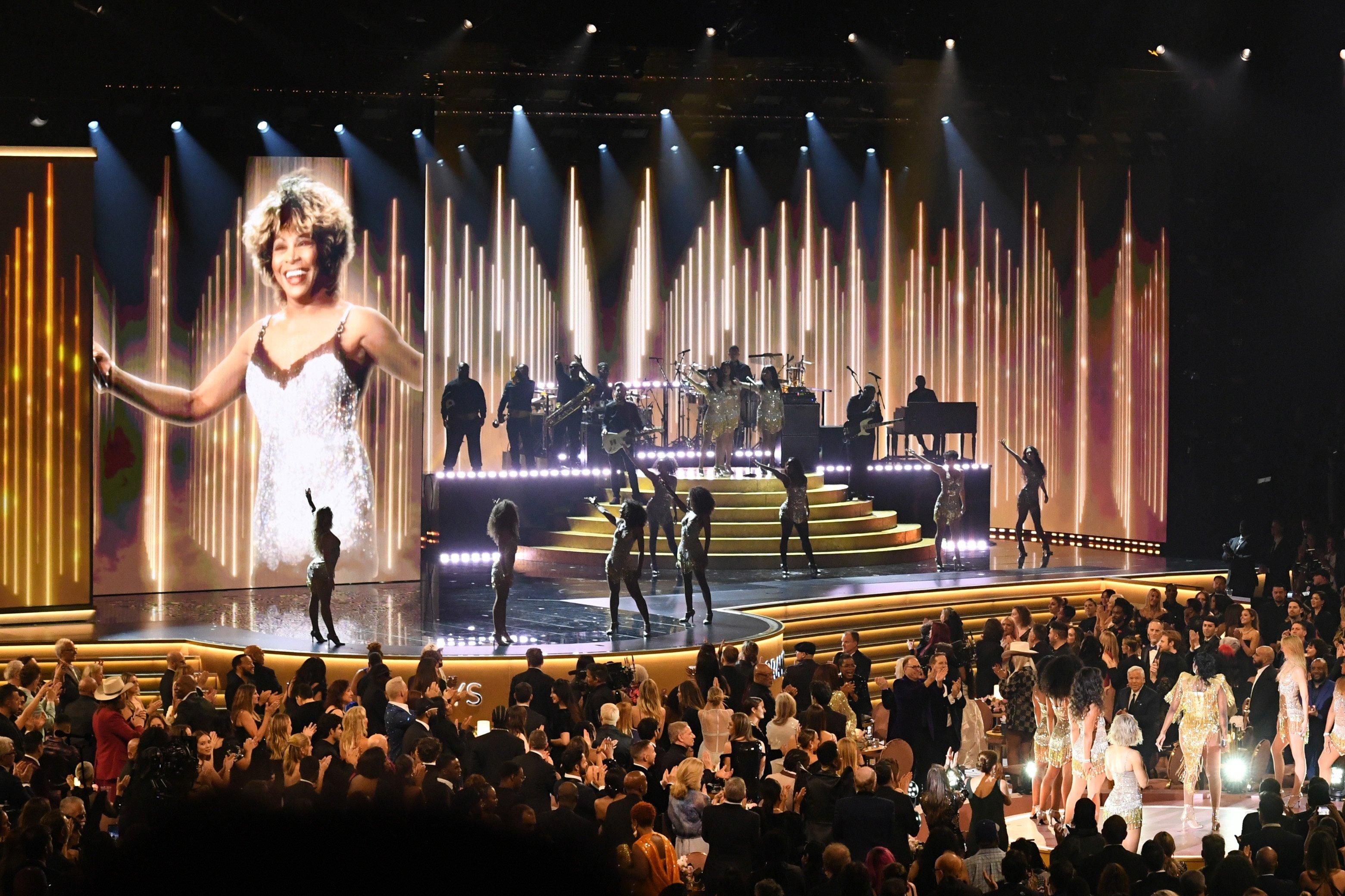
Photo: JC Olivera/WireImage
news
2024 GRAMMYs In Memoriam: Stevie Wonder, Lenny Kravitz & More Pay Tribute To Late Icons
A star-studded tribute honored the late leading lights of the music industry. In a heartfelt and exciting segment, Tina Turner was remembered with a spirited cover of "Proud Mary" and while Stevie Wonder did a tender posthumous duet with Tony Bennett.
Oprah Winfrey, Stevie Wonder and more graced the GRAMMYs stage for a star-studded tribute to Tina Turner, Tony Bennett and other stars we lost in 2023.
The In Memoriam segment of the 2024 GRAMMYs began with Wonder honoring the "I Left My Heart in San Francisco" crooner, who passed away in July after a long battle with Alzheimer's. With Wonder on piano and an ethereal, archival video of Bennett singing, the two created a tearjerker posthumous duet of "For Once in My Life" before transitioning into "The Best is Yet to Come."
Next, a video memorialized Jimmy Buffett before a visibly emotional Annie Lennox appeared on stage with Wendy and Lisa to remember Sinead O'Connor with a tender cover of the late Irish alt pioneer's classic single "Nothing Compares 2 U." "Artists for ceasefire! Peace in the world!" the Eurythmics icon shouted with raised fist at the end of her performance.
Elsewhere during the In Memoriam package, Burt Bacharach was celebrated for his unmistakable impact on popular music throughout the 20th century. Then, Lenny Kravitz paid respect to Clarence Avant as the "Godfather of Black Music" with a tribute that included a performance of "Ain't No Sunshine" and "Lean on Me" by Jon Batiste. Ann Nesby, Jimmy Jam, Terry Lewis and others joined later to perform "Optimistic."
Read more: Remembering The Artistry Of Tina Turner, "The Epitome Of Power And Passion"
Last but certainly not least, Oprah Winfrey ushered in a tribute to Turner, saying "Tina Turner was always a towering figure. She is our forever goddess of rock and roll who inspired millions, a moving symbol of grace and grit, soul and power…And as those big wheels of time keep on turnin’, Tina’s voice continues to speak to all of us."
Following her remarks lionizing the Queen of Rock 'n Roll and nine-time GRAMMY winner, Oprah ceded the stage to Fantasia Barrino for a transcendent, celebratory performance (with much dancing, as Turner would have wanted) of "Proud Mary" that went from the stage to the audience and back.
2024 GRAMMY Nominations: See The Full Winners & Nominees List
.jpg)
Photo: Michael Kovac/Getty Images for The Recording Academy
video
GRAMMY Rewind: Watch Beyoncé's Heartfelt Speech For Her Record-Breaking Win In 2023
Relive the night Beyoncé received a gramophone for Best Dance/Electronic Album for 'RENAISSANCE' at the 2023 GRAMMYS — the award that made her the most decorated musician in GRAMMY history.
Six years after her last solo studio album, Beyoncé returned to the music industry with a bang thanks to RENAISSANCE. In homage to her late Uncle Johnny, she created a work of art inspired by the sounds of disco and house that wasn't just culturally impactful — it was history-making.
At the 2023 GRAMMYs, RENAISSANCE won Best Dance/Electronic Album. Marking Beyoncé's 32nd golden gramophone, the win gave the superstar the record for most gramophones won by an individual act.
In this episode of GRAMMY Rewind, revisit the historic moment Queen Bey took the stage to accept her record-breaking GRAMMY at the 65th Annual GRAMMY Awards.
"Thank you so much. I'm trying not to be too emotional," Beyoncé said at the start of her acceptance speech. "I'm just trying to receive this night."
With a deep breath, she began to list her praises that included God, her family, and the Recording Academy for their continued support throughout her career.
"I'd like to thank my Uncle Johnny, who is not here, but he's here in spirit," Beyoncé proclaimed. "I'd like to thank the queer community for your love and inventing this genre."
Watch the video above for Beyoncé's full speech for Best Dance/Electronic Album at the 2023 GRAMMYs. Check back to GRAMMY.com for more new episodes of GRAMMY Rewind.
Tune into the 2024 GRAMMYs on Sunday, Feb. 4, airing live on the CBS Television Network (8-11:30 p.m. LIVE ET/5-8:30 p.m. LIVE PT) and streaming on Paramount+ (live and on-demand for Paramount+ with SHOWTIME subscribers, or on-demand for Paramount+ Essential subscribers the day after the special airs).
